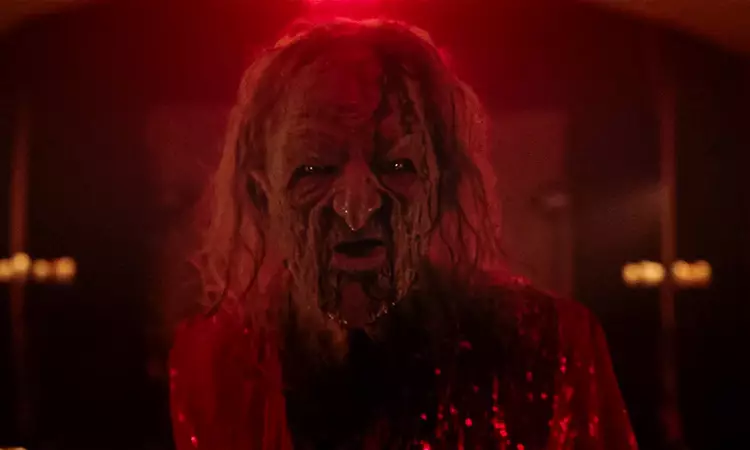The recent film ‘Members Club,’ directed by Marc Coleman, explores the grotesque and absurd by blending horror and comedy in a way that challenges traditional narratives. While it ostensibly pays homage to male camaraderie and the world of outdated masculinity, it subversively criticizes the very essence of male identity.
The movie opens with a striking scene that sets the tone for its dark humor: Geoff, played by David Schall, arrives at a members-only club with a conspicuous ‘No Dogging’ sign, only to promptly engage in the act itself. This sequence serves as a harbinger for the chaos that unfolds and the brutal penalties that follow when societal norms are flouted. Geoff’s subsequent violent demise at the hands of unknown assailants with a wooden fence post reinforces horror’s essence, demonstrating that violence frequently lurks beneath the surface of comedy. This analogical violence, rather than signaling fear, transmutes into an instrument of ridicule, critiquing patriarchal transgressions.
The film’s central characters—the male strippers known as Wet Dreams—are depicted as past their prime, flabby, and humorously desperate. As individuals, they embody a state of decay, their former glory lost to the sands of time. Alan, the group’s de facto leader, played by Dean Kilbey, struggles with self-worth, compounded by the burden of failed relationships, particularly with his daughter Daisy. This familial tension provides a deeper layer to the narrative, allowing viewers to witness the intersecting crises of middle age and fatherhood. As the plot progresses and the group is lured to a dangerous gig, the horror comedy genre expertly showcases the vulnerability of these men against the backdrop of their impending doom.
As Wet Dreams unwittingly walk into a deadly ritual aimed at resurrecting Agnes Whitewood, a sixteenth-century witch, the film cleverly flips the narrative script. The presence of a powerful female antagonist seeking revenge against her male oppressors introduces a feminist critique into the mix. Though witchcraft typically symbolizes women’s resistance against patriarchal oppression, ‘Members Club’ complicates this trope by depicting the male characters’ emasculation through brutal acts. Here, the grotesque takes center stage; the strippers’ punishment is not merely physical but emblematic of their waning potency in a world that has little patience for outdated versions of masculinity.
Through absurd and surreal elements, Coleman crafts a narrative steeped in incongruity. The film features bizarre cameos—most notably, a one-eyed ex-darts player portrayed by Steve Oram and a sleazy Greek character named Adonis played by Peter Andre—illustrating that the banal meets the bizarre. These characters serve to elevate the absurd atmosphere of the narrative, which challenges the audience’s expectations of traditional horror and comedy motifs. In a realm where grotesque acts are punctuated by slapstick humor, Coleman succeeds at stripping moments of eroticism from dance routines, presenting sexuality and masculinity in an unflattering, even ludicrous light.
In the climax, Alan’s character arc culminates in a jarring transformation from a caricature of harmless and clueless masculinity to embodying raw male aggression. This sharp pivot unveils the underlying fear of male violence and the potentiality for harm that lurks even within the most pitiful of characters. Yet, despite this grim realization, the film hints at a need for reflection and growth amid chaos and absurdity. Alan’s journey forces him to confront not only the palpable threats surrounding him but also his own shortcomings as a father and man.
‘Members Club’ is more than just a horror-comedy; it is a reflective examination of male identity through the lens of societal decay and familial relationships. While its grotesque humor may initially seem shocking, deeper analysis reveals a narrative steeped in critique—of masculinity, patriarchal oppression, and even the notion of nostalgia for the past. The film’s ending leaves audiences to ponder the possibility of redemption amidst absurdity, suggesting that confronting the grotesque may be the first step toward transformation. In the end, ‘Members Club’ boldly serves as a mirror, reflecting our discomfort with the absurdity of modern masculinity and the intricate dance between power and vulnerability.

